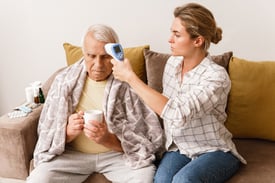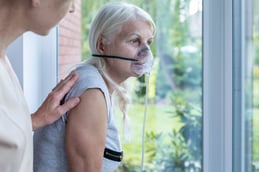Everyone has heard about Influenza and COVID-19, but there is another common respiratory virus that causes significant disease to be aware of: Respiratory Syncytial virus (RSV). RSV is a RNA (ribonucleic acid) respiratory virus that can cause mild upper and/or lower respiratory infection, but it can also cause serious illness in infants, older adults, and those with a suppressed immune system. It is one of the most common viruses to infect children (most children have had it by 2 years of age), but it is increasingly being recognized as causing significant disease in older adults and in adults with increased risks. Approximately 3-10% of adults > 65 years of age contract the virus. Just like Influenza and COVID-19, it causes many hospitalizations and deaths. There are currently 1-2 per 1000 adults > 65 that require hospitalization, and about 10,000 deaths per year. This is similar to that of Influenza A in a vaccinated population. RSV tends to be seasonal, and most infections occur in the fall and winter, just like the flu. Unfortunately, having had RSV doesn’t prevent you from getting it again. RSV tends to be seasonal, and most infections occur in the fall and winter, just like the flu. Unfortunately, having had RSV doesn’t prevent you from getting it again.
How is RSV Transmitted?
The virus is spread by direct contact to your eyes, nose, or mouth with droplets or secretions from an infected person. This commonly occurs when an infected person coughs, sneezes, or touches surfaces that others touch. It takes 3-6 days for the virus to multiply enough to give you symptoms. This is called the incubation period.
Symptoms

Typical symptoms are mild, and include those of a cold such as sneezing, nasal congestion, runny nose, sore throat, low grade fever, a dry cough, and feeling unwell. This usually resolves in 1-2 weeks.
However, in infants, older adults, those with lung problems such as asthma or COPD, chronic heart disease, or those with a suppressed immune system, it can spread to the lower respiratory tract and cause more severe disease. More severe disease causes bronchiolitis (inflammation in the small airways called bronchioles), wheezing, shortness of breath, low oxygen levels, and pneumonia. This can require hospitalization and even result in death.
How is RSV Diagnosed?
RSV, Influenza, and COVID-19 all have similar symptoms. Symptoms of both overlap with symptoms of Influenza and COVID-19. Muscle aches, high fever, nausea, and vomiting are more likely with Influenza and COVID-19, but they can occur with RSV too. Patterns of infection in your community may make one or another more likely, but these patterns change on a weekly basis. Therefore, in higher risk people where knowing the diagnosis makes a difference in treatment, doing a rapid multi-plex polymerase chain reaction (PCR) test that can simultaneously test for RSV, Influenza, and COVID-19 makes sense. This is because there are specific medications for Influenza and COVID-19, but there is no specific medication for RSV. The PCR tests are preferred because they are more reliable than antigen tests.
Treatment
There is no curative treatment, therefore, treatment is for symptoms and support. Acetaminophen (Tylenol) for headache, fever, sore throat pain, and muscle aches can be helpful. (Never give aspirin to children.) Over the counter cold and cough medicines may also be used. More severe coughs can be treated with prescription cough medicines. It is also important to drink plenty of fluids to prevent dehydration.
Severe disease may require hospital admission for treatment with IV fluids, antibiotics for complicating bacterial infection, oxygen, aerosolized treatments for wheezing, and in the most severe cases, a ventilator if the lungs are not able to do the work of breathing on their own.
Prevention
HANDWASHING is the single most important thing you can do to prevent RSV, Influenza, and other viruses. Smoking increases your risk of infection and more severe disease, so quit smoking if you smoke, and avoid second-hand smoke. Wash commonly touched surfaces, do not share silverware or drinking glasses, and avoid crowded places and people who are known to be ill. Avoid touching your face as you may transmit virus from your hands to your eyes, nose, or mouth.
Premature infants < 6 months of age with chronic lung disease and infants with congenital heart disease < 2 years of age may be candidates for RSV prevention with Palivizumab (Synagis), a monoclonal antibody given as a monthly shot during RSV season. It does not help as treatment if an infant or child already has RSV, and it is not used in older children or adults.
Prevention With Vaccination - Approved May 3rd, 2023
GSK’s RSV vaccine was approved by the FDA on May 3rd, 2023. It will marketed under the name Arexvy, and should be available by Fall, 2023 in time for the start of the RSV season. It was shown that the vaccine reduced the risk of developing RSV lower respiratory tract disease by 82.6% and reduced the risk of developing severe RSV lower respiratory tract disease by 94.1%. We at Chase Medical Research are proud to have conducted one of the trials that culminated in the approval of the GSK vaccine.
There are two RSV vaccines that may soon be an option. Moderna and Pfizer both have vaccines that are in Phase 3 clinical trials. Phase 3 trials are done on large numbers of people, and they are the final type of trial before medications, vaccines, or medical devices can be evaluated by the FDA for approval.
Clinical Trials
Chase Medical Research has experience in conducting trials for RSV and many other diseases. If you are interested in participating in one of our trials, please check out our currently enrolling trials here.
References:
- Ann R. Falsey, M.D., Patricia A. Hennessey, R.N., Maria A. Formica, M.S., Christopher
Cox, Ph.D., and Edward E. Walsh, M.D., Respiratory Syncytial Virus Infection in Elderly and High-Risk Adults, N Engl J Med 2005; 352:1749-1759. - Centers for Disease Control. https://www.cdc.gov/rsv.
-
Charles P. Vega, MD. https://www.medscape.com/viewarticle/985513_2, Medscape, December 15, 2022.
- NIH National library of Medicine. Hanish Jain, John W. Schweitzer, Nathaniel A. Justice https://www.ncbi.nlm.nih.gov/books/NBK459215/ updated 11/8/2022.
- Marie R. Griffin, M.D., M.P.H., A Challenge to Respiratory Syncytial Virus Illness in Adults, 2022; 386:2427-24285.
- FDA News Release https://www.fda.gov/news-events/press-announcements/fda-approves-first-respiratory-syncytial-virus-rsv-vaccine
Share This Post
Recent Posts
- The Relationship Between Obesity and Obstructive Sleep Apnea January 30 2023
- Cardiovascular Outcome Clinical Trials January 30 2023
- Diabetic Peripheral Neuropathic Pain January 30 2023
- Are All Types of Cholesterol Bad? January 30 2023
- Blood Pressure: The Highs, the Lows, and Everything in Between January 30 2023
Categories
- Clinical Trials
- Cardiovascular Disease
- Diabetes
- Obesity
- Kidney Disease
- Hypertension
- Pain Management
- Vaccine
- Cholesterol
- Chronic Obstructive Pulmonary Disease
- Diabetic Peripheral Neuropathy
- Migraine
- Osteoarthritis
- Biologics
- COVID-19
- Gastroesophageal Reflux Disease
- Irritable Bowel Syndrome with Constipation
- Lyme Disease
- Nonalcoholic Steatohepatitis
- Respiratory Syncytial Virus



